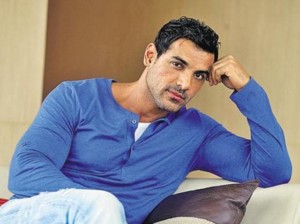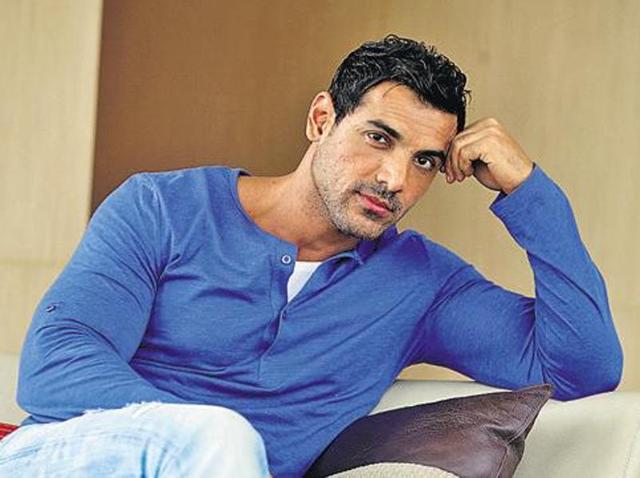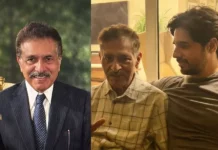 He hasn’t had a film release since Force 2 (2016) but John Abraham is clearly not losing sleep over it. Instead, the actor is happy working at his own pace as he doesn’t want to “get into a rat race.” Now, as he readies for his next, Parmanu: The Story of Pokhran, based on India’s nuclear tests conducted in Pokhran, Rajasthan in 1998, John admits that he has always tried to “marry commerce with content.”
He hasn’t had a film release since Force 2 (2016) but John Abraham is clearly not losing sleep over it. Instead, the actor is happy working at his own pace as he doesn’t want to “get into a rat race.” Now, as he readies for his next, Parmanu: The Story of Pokhran, based on India’s nuclear tests conducted in Pokhran, Rajasthan in 1998, John admits that he has always tried to “marry commerce with content.”
2018 is your 15th year in Bollywood. How has the journey been till now?
Honestly speaking, it’s all been the blessing of my audience and I have always said that. My godfather is my audience. For someone who has nobody in the industry, people are his godfather. I think my fans have loved me a lot and held me close; and it’s all thanks to them that I am here. So, I am grateful to my well-wishers. They are the most fantastic people in my life.
You have been missing in action for the past few months…
I have been busy developing content and I really enjoy that. Parmanu took me and my director (Abhishek Sharma) two-and-a half years but I think it has been worth the wait. I have been developing other content too. I also believe there is no point being in the news just for the sake of it. So I would rather stay out of it.
Did you not miss being on the big screen for a year?
Not really! I was okay. Audiences should look forward to what are you going to do next and that’s important. I want to belt out good stuff and not crap, just to be in the news. So, I don’t have the ‘airport look.’ What’s this airport or the gym look? I don’t understand all of that as I’m just interested in making good films. I want to make it for my audience.
With so much competition around, do you ever bother about the ‘race’ in the industry?
I feel blessed but at the same time, lucky too. So, the younger lot gets along with me really well as they know that this guy is on his own trip but he is like one of us, so they are like, ‘oh, he is cool, easy, and doesn’t seem to have any kind of insecurity.’ I think that stems from the kind of person I am. I am happy that I am running my own race and even if I try, I can’t get into a rat race. I think I will harm myself. I will hurt myself and won’t be here in the long run if I start running the race like everybody else. Just four-five people are running one race, but there is so much else out there in terms of content, subjects and directors. So, please look outside and stop running after the same race.
Be it Madras Café or Parmanu, how tough is it to make an entertaining cinema that’s relevant and engaging as well?
It is tough. I give credit to all the directors who – over the years – have been associated with us. So, if we did Vicky Donor and Madras Café, the credit goes to Shoojit (Sircar). This time, the credit goes to Abhishek for Parmanu. I always try and marry commerce with content. That is very tough though. People ask me, ‘why do you take so much time and make difficult things when you are an A-list commercial hero and can do the easiest things and get away with it?’ But I feel normal is boring and there is no fun in it. It’s good to take that risk and while you doing that, people are anyway writing your obituary (laughs). So, it’s okay. What can you do to me? I have been buried many times. So, once more is okay.
How challenging was it to make Parmanu?
What happened on May 11, 1998 is probably one of the most defining moments of India. If youngsters today feel cool about being an Indian and they have a sense of being an Indian; and if India today feels like a superpower, it is because of what happened on the day that changed the course of our country. This story has never been told. It’s just like I made Madras Café based around Rajiv Gandhi’s assassination that impacted my life. So, I feel the story of India’s nuclear tests need to be told. Along with Abhishek Sharma, I hope we have done a good job in Parmanu.
Parmanu is based on a lot of facts. In that sense, was it a different experience for you?
More than different, it was difficult. The film is based on facts; so we had to reach out to DRDO, ISRO, BARC and the intelligence bureau and the army. We had to involve people from different facets and departments that made nuclear test happen in 1998, so a lot of people were directly or indirectly involved in it in the film. It was a very enriching experience to meet people and meet people who have actually worked on it directly. Colonel MK Sharma was the second in command in 1998, when the test happened. He was on set every day with us. He took us through the entire process. We also met important people, who were part of the government at that point of time.
Have you also tried to balance the entertainment factor with the real story in Parmanu?
Yes, and that’s why I want this film to be affluent and intelligent, but I also want it to be organic and reach out to the lowest common denominator. I have simplified this film and made sure this film reaches out to everyone. That is why the film is titled Parmanu, which means ‘atom.’ I feel people have to be educated about it. At the end of the day, I want to make a thrilling, entertaining and commercial film but I also want the audience to be entertained.
Are the sensibilities of an actor and a producer completely different?
Not in today’s day-and-age. Earlier, there used to be a difference but today, I think the lines have merged. Both the producer and the actor think on the same lines nowadays. The producer doesn’t want to make just art film but also commercial ones, and the actor also wants to do commercial movies. The producer as well as the actor wants to make commercial films that have content. So, I think they both have come together.
-Courtesy Hindustan Times







